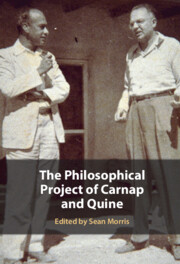Book contents
- The Philosophical Project of Carnap and Quine
- The Philosophical Project of Carnap and Quine
- Copyright page
- Dedication
- Contents
- Contributors
- Acknowledgments
- Introduction
- Part I Carnap, Quine, and Logical Empiricism
- Part II Carnap, Quine, and American Pragmatism
- Chapter 4 Pragmatism in Carnap and Quine
- Chapter 5 Objectivity Socialized
- Chapter 6 Whose Dogmas of Empiricism?
- Part III Carnap and Quine on Logic, Language, and Translation
- Part IV Carnap and Quine on Ontology and Metaphysics
- Bibliography
- Index
Chapter 6 - Whose Dogmas of Empiricism?
from Part II - Carnap, Quine, and American Pragmatism
Published online by Cambridge University Press: 18 February 2023
- The Philosophical Project of Carnap and Quine
- The Philosophical Project of Carnap and Quine
- Copyright page
- Dedication
- Contents
- Contributors
- Acknowledgments
- Introduction
- Part I Carnap, Quine, and Logical Empiricism
- Part II Carnap, Quine, and American Pragmatism
- Chapter 4 Pragmatism in Carnap and Quine
- Chapter 5 Objectivity Socialized
- Chapter 6 Whose Dogmas of Empiricism?
- Part III Carnap and Quine on Logic, Language, and Translation
- Part IV Carnap and Quine on Ontology and Metaphysics
- Bibliography
- Index
Summary
It has become a commonplace that Carnap is the lead empiricist in Quines Two Dogmas of Empiricism. Recent work by Richard Creath, Robert Sinclair, and others stirs up this comfortable narrative, pointing to broader areas of agreement between Quine and Carnap, including Quines positive assessment of the Logische Syntax in his Lectures on Carnap, and the influence of pragmatism on both. Following a hint from a colleague, I investigate whether at least some strains of empiricism that Quine rejects in Two Dogmas belong to Quines mentor, C. I. Lewis, instead. The paper assesses the philosophical and historical consequences of reading Two Dogmas in this way.
Keywords
- Type
- Chapter
- Information
- The Philosophical Project of Carnap and Quine , pp. 114 - 132Publisher: Cambridge University PressPrint publication year: 2023
- 3
- Cited by

